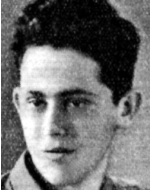Hechter, Yair
Son of Haviva and Herzl, was born on 25 August 1925 in Givat Hashlosha, where he grew up in Kfar Sava and after graduating from the elementary school he studied electrical engineering at the Max Payne Professional School. He joined the Palmach and served in Ramat Hakovesh, Maoz Haim, Ginossar and Ayelet Hashahar (where he spent some time as a child). He was known as a good friend, a gifted chess player who beat all his opponents. He served as the commander of a class, trained and trained many Palmach members, and was especially successful in guiding the tour and teaching topography. With the outbreak of the War of Independence, he returned to service in a unit of the “Harel” Palmach Brigade, participated as a combat soldier and accompanied the convoys and many battles in the breakthrough to Jerusalem. He went to Jerusalem in the great convoy before Passover and remained stuck there in the siege and continued to fight on the fronts of Ramat Rachel, Sheikh Jarrah, Katamon and Radar. In those days, he also instructed the reinforcements received by the brigade. During the second break he returned to the Shfela and from there was sent to the Negev, and he survived many battles, but in his letters to his parents he emphasized that what As he had done so far, as he had done to many others, yet he carried out every task courageously and with cold-heartedness, recognizing the duty and influencing his inner confidence in his subordinates, who were willing to follow him in the face of any danger. And spaces from the battlefield under bullets and shells. “In one of his letters to his parents, he wrote:” A land is bought with blood In the school, the role of blood is not only to transfer food to the body, but also to quench the soil; Otherwise she does not respond … “In another letter:” I do not come to lecture on Zionism. The chick does not teach the chicken, but now the chicken is a rooster – I have become a conscious Zionist only now, and all I have to do is see Zion standing on its own, and if not me – the ones who follow me. “His letters reflected the spirit of the Palmach boys in those days. His subordinates knew how to appreciate him even in the storms of war. One wrote: “I know many young men in the Palmach, but it is clear to me that he was one of the best. On December 24, 1948, he took part in Operation Horev as deputy commander of the company and fell in Auja al-Hafir (Nitzana), where he was buried in Halutza, And was later transferred to the Kfar Sava cemetery, where he was awarded the rank of first lieutenant.
